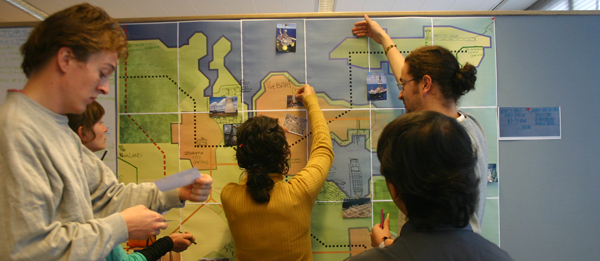Blog
Visioning the future built environment
Workshop visioning the future built environment as part of Climate-KIC Summer School
- Problem owner: Climate-KIC
- Process owners:
- Facilitators: Susie Brand-de Groot, Jan-Willem Hoftijzer, and Ricardo Mejia (ID Studio Lab, Delft University of Technology)
- Participants: Ph.D.’s, postdocs, Master students and driven professional.
Challenge
Complex topics like urbanization and energy management need special commitment in unifying a common view, especially due to the amount of parties co-designing and co-producing products and services for its development. This requires collaboration across departments and partnering companies and is connected to problems of communication and concerted action between partners. Different parties need to develop a joint understanding, goals, and agenda.
To create a set of alternative futures -to unify the vision of stakeholders- that cover many possibilities the technique called “scenario thinking” as a way of dealing with ambiguity and uncertainty is used from a strategic perspective.
In a ten-hours-long workshop the attendees, guided by a group of facilitators, will explore diverse future scenarios of buildings and then will develop different kind of solutions regarding new low carbon technologies using a variety of creative techniques.
Taller con la Cámara de Comercio de Bogotá, Programa Bogotá Innova – Diseño de la idea, gestión de diseño y prototipado de experiencias 2013.
La metodología presentada explica y estructura el entrenamiento en diseño de la idea – gestión de diseño y prototipado de experiencias dentro del programa “Luces, Cámara, Innovación” acorde con sus antecedentes y respondiendo a sus directrices y objetivo general.
Objetivo
El “entrenamiento en diseño de la idea – gestión de diseño y prototipado de experiencias” tiene por objeto formar a los empresarios participantes en temas asociados con el proceso de gestión de las ideas y el diseño, incluyendo la elaboración y validación de prototipos de estos dos pilares: diseños e ideas, de nuevos o mejorados productos, servicios y/o negocios con el ánimo de seleccionar ideas de acuerdo con criterios claramente establecidos y jerarquizados.
TransMilenio requiere doble carril por la caracas
Javier Ricardo Mejia Sarmiento
Future Scenario (part 1): Barist, an imaginary country.
Future Scenarios (also called scenario planning, scenario thinking or scenario analysis) is a strategic planning method that some organizations use to make flexible long-term plans. The term scenario was introduced into planning and decision-making by Herman Kahn in the 1950s.
A scenario can be defined as: “A rich and detailed portrait of a plausible future world, one sufficiently vivid that a planner can clearly see and comprehend the problems, challenges and opportunities that such an environment would present.”

